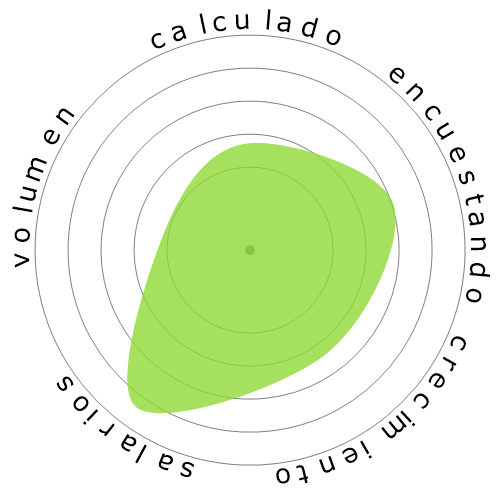Pilotos Comerciales
¿A dónde te gustaría ir a continuación?
O, Explora Esta Profesión en Mayor Detalle...


¿Qué muestra este copo de nieve?
¿Qué es esto?
Calificamos los trabajos usando cuatro factores. Estos son:
- Probabilidad de ser automatizado
- Crecimiento laboral
- Salarios
- Volumen de posiciones disponibles
Estos son algunos puntos clave a considerar cuando se busca empleo.
Las personas también vieron
Riesgo de automatización calculado
Riesgo Moderado (41-60%): Las ocupaciones con un riesgo moderado de automatización generalmente implican tareas rutinarias pero aún requieren cierto juicio e interacción humanos.
Más información sobre qué es esta puntuación y cómo se calcula está disponible aquí.
Encuesta de usuarios
Nuestros visitantes han votado que hay una baja probabilidad de que esta ocupación se automatice. Sin embargo, el nivel de riesgo de automatización que hemos generado sugiere una mayor probabilidad de automatización: 55% probabilidad de automatización.
¿Cuál crees que es el riesgo de la automatización?
¿Cuál es la probabilidad de que Pilotos Comerciales sea reemplazado por robots o inteligencia artificial en los próximos 20 años?
Sentimiento
El siguiente gráfico se muestra donde hay suficientes votos para producir datos significativos. Muestra los resultados de las encuestas de usuarios a lo largo del tiempo, proporcionando una clara indicación de las tendencias de sentimiento.
Sentimiento a lo largo del tiempo (trimestralmente)
Sentimiento a lo largo del tiempo (anualmente)
Crecimiento
Se espera que el número de ofertas de trabajo para 'Commercial Pilots' aumente 5,7% para 2033
Empleo total y estimaciones de vacantes laborales
Las proyecciones actualizadas se deben 09-2025.
Salarios
En 2023, el salario anual mediano para 'Commercial Pilots' fue de 113.080 $, o 54 $ por hora.
'Commercial Pilots' recibieron un salario 135,3% más alto que el salario medio nacional, que se situó en 48.060 $
Salarios a lo largo del tiempo
Volumen
A partir de 2023, había 52.750 personas empleadas como 'Commercial Pilots' dentro de los Estados Unidos.
Esto representa alrededor del < 0,001% de la fuerza laboral empleada en todo el país.
Dicho de otra manera, alrededor de 1 de cada 2 mil personas están empleadas como 'Commercial Pilots'.
Descripción del trabajo
Pilotea y navega el vuelo de aeronaves de ala fija en rutas de aerolíneas no programadas, o helicópteros. Requiere certificado de Piloto Comercial. Incluye a pilotos charter con certificación similar, y pilotos de ambulancia aérea y de tours aéreos. Excluye a pilotos de aerolíneas regionales, nacionales e internacionales.
SOC Code: 53-2012.00
Comentarios (107)
Personally, I think people will accept it surprisingly quickly after some initial hesitancy, just like there was with AI-generated content and general purpose LLM chatbots at the beginning. (There still is resistance - and I'm part of it - but ChatGPT etc. has already taken a huge chunk out of Google's market share, and I know so many people of all ages who treat its answers as gospel.) By the time Gen Alpha has come of age, long before 2046, unmanned cars and planes will be a standard part of their life, like so many "robot" jobs.
In this case, regulation is the hold-up, not the technology.
Allowing robots to operate planes that carry varying numbers of passengers, such as smaller regional jets accommodating around 50 to 100 passengers, and larger airliners like the Boeing 737 or Airbus A320 series carrying between 140 to 240 passengers, or wide-body aircraft like the Boeing 777 or Airbus A380 with capacities ranging from around 300 to over 800 passengers, could pose significant risks to people's lives.
The possibility of robot malfunctions raises concerns about placing full trust in their abilities.
Rightly or wrongly, with the number of DEI initiatives at present and several recent high-profile transport incidents caused by user error, I foresee many people choosing AI over humans in life-or-death professions. I make no judgement on that, personally, but I know a lot of people are bearish on such hiring policies, especially in critical industries. As for the technology, one only need look at the progress of AI in automated driving since 2020 to see that self-flying planes will almost surely exist by 2045. (I'm a computer scientist, by the way. My own job will be gone too -- and much sooner. I'm opposed to AI on principle and I've grown to hate my own field. But I've also got to be honest about it because I understand where we are.)
have to be 1000% reliable in order to not cause problems
can scare public away
Examples like TACA Flight 110, where a Boeing 737-300 lost both engines, show this. Instead of following the manual and returning, the pilots landed on the grass ahead, which was the right decision. This applies to many situations. In the case of United Airlines Flight 232, it's another example. Following the correct protocols isn't always the right choice and can sometimes prevent worse tragedies.
In the United case, let's suppose an AI is in command and the plane loses all three hydraulic systems. The company's manual doesn't cover a situation where all engines are lost. At that moment, what would the AI do? Even if it follows the tower controller's voice commands correctly, it’s impossible to determine the flight's fate because there's no human inside. However, this isn't to say that following protocols is always wrong. It’s just a reminder to follow protocols, but if you ever need to break them, it should be in a life-or-death situation.
Responder al comentario